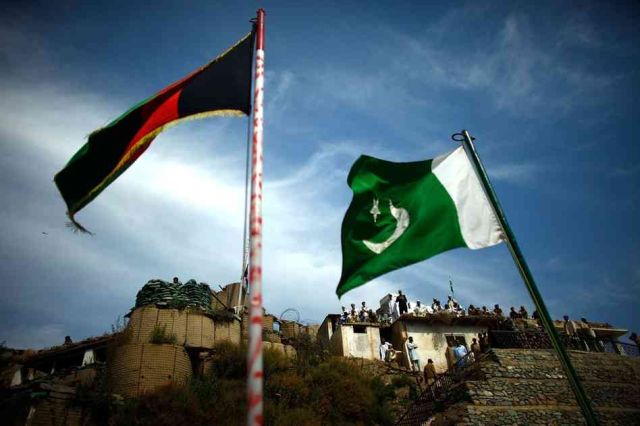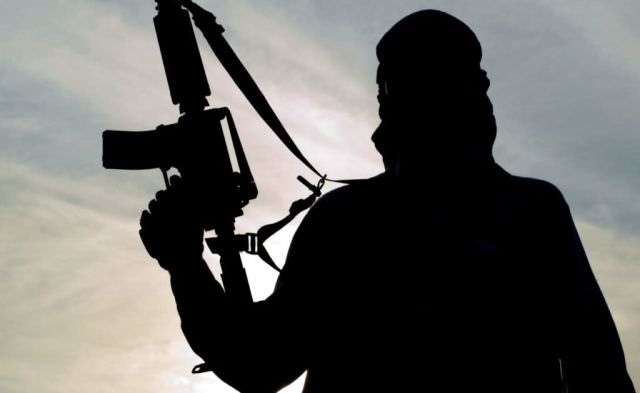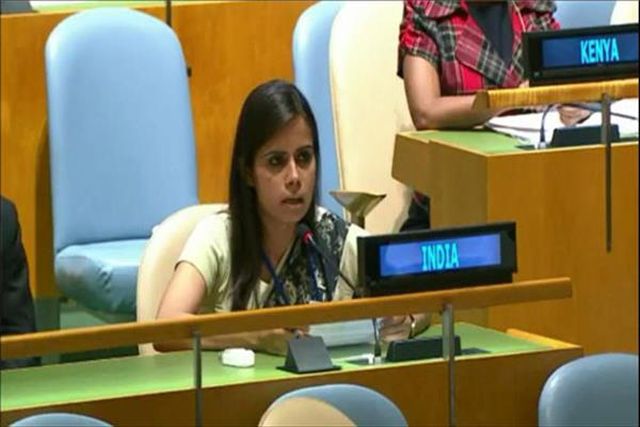
by Editor | May 25, 2021 | Muslim World
 Islamabad : Pakistan, in an attempt to resume a quadrilateral peace process that can help set an end to the Afghan war, has asked all the concerned group members to meet in Oman next week, the media reported on Tuesday.
Islamabad : Pakistan, in an attempt to resume a quadrilateral peace process that can help set an end to the Afghan war, has asked all the concerned group members to meet in Oman next week, the media reported on Tuesday.
Afghanistan, the US, China and Pakistan are members of the Quadrilateral Cooperation Group, reports Dawn news.
Pakistan Foreign Minister Khawaja Asif told the Voice of America while he was on an official visit to Washington last week that Islamabad would play a leading role in this quadrilateral session, aimed at bringing the Afghan Taliban to the negotiating table.
The group first met in January 2016 and has had five sessions so far, the last was held in May 2016 in Murree town, Punjab province.
The process was plagued by problems from the beginning. First, the Taliban refused to join it unless given the same status as the Afghan government. When they were persuaded to attend, relations between Kabul and Islamabad strained, reports Dawn news.
The international community too welcomed the quadrilateral talks because all four countries are seen as crucial to ensuring the success of any peace talks on Afghanistan.
The Pakistani Foreign Minister acknowledged that Pakistan too was losing its influence on the Taliban.
“At least for our influence on Taliban today, there is mistrust,” Asif told the VOA, adding that he believes Russia “today has more influence on the Taliban than Pakistan does”.
Despite these concerns, all four members of this group want some peace in Afghanistan and are likely to participate in the Muscat meeting on October 16.
But instead of sending their senior officials, as they did to the last five meetings, they are likely to send mid-level officials to prepare for future talks.
—IANS

by Editor | May 25, 2021 | Opinions
 By C. Uday Bhaskar,
By C. Uday Bhaskar,
Almost 16 years to the day since the US embarked upon its war on terrorism against the Afghan Taliban on October 7, 2001, as reprisal for the enormity of the 9/11 terrorist attacks, it appears that a White House administration is again issuing dire warnings to Rawalpindi (GHQ of the Pakistan Army) while still dangling the familiar “carrot”.
At a congressional hearing of the US Senate Foreign Relations Committee in Washington DC on Tuesday (October 4), General Joseph Dunford, Chairman, US Joints Chiefs of Staff, observed candidly: “I think it’s clear to me that the ISI has connections with terrorist groups.” This is not the first time that an incumbent in his chair has come to such a determination.
US Defence Secretary Jim Mattis had a similar assessment, adding that while Pakistan may have come down on terrorism, “the ISI appears to run its own foreign policy”. This is an unusually unambiguous assertion by a senior US offical but General Mattis added the caveat too: “We need to try one more time to make this strategy work with them; by, with and through the Pakistanis. And if our best efforts fail, the President (Trump) is prepared to take whatever steps are necessary.”
The war in Afghanistan, where Pakistan was accorded the status of a major non-NATO ally, has been expensive for the US both in terms of blood and treasure. A study by the Brown University estimates that, as of 2016, the US may have spent up to $ 2 trillion towards the Afghan campaign, which still remains inconclusive and messy.
As a benchmark, it may be relevant to note that India’s GDP in 2016 was estimated to be $ 2.26 trillion. The total number of people killed since the US led war against terror began in October 2001 has crossed 370,000 and the number displaced is upwards of 800,000. And the violence continues.
Will the latest warning by the Trump team have the desired effect on the Pakistani Inter Services Intelligence (ISI) and the “deep-state” in that country? It is difficult to be optimistic.
Three high-level political visits in end September frame the intractable nature of the Afghan war. They were dramatically illustrated by events in Kabul. Mattis arrived in Kabul from Delhi (September 26) and a few hours later the airport was subjected to rocket fire by the local Taliban. This attack on the Kabul airport led to a delay in the visit of Abdullah Abdullah, CEO of Afghanistan, to Delhi.
It is pertinent to note that in their public remarks in Kabul and Delhi, the two men reiterated the imperative of closing down safe havens and sanctuaries for terror groups and dismantling the infrastructure in the region that supports such bloodshed.
The not-so-subtle reference was to Pakistan and its deep-state that continues to support groups such as the Haqqani network, the Lashkar-e-Taiba and its affiliates.
This brings us to the third visit — that of Pakistani Prime Minister Shahid Khaqan Abbasi in end September to the US, where he asserted that charges of Pakistan sheltering terrorists were “untrue”, and that the only cross-border movement of terrorists was “from Afghanistan to Pakistan”!
Abbasi went further and categorically ruled out any role for India in the reconstruction of Afghanistan, adding, “Zero, we don’t foresee any political or military role for India in Afghanistan.”
This inflexible veto that Pakistan has accorded unto itself in relation to the internal affairs of Afghanistan and the brazen manner in which it continues to deny the role being played by Rawalpindi in supporting terror groups lies at the core of the political and military challenge for the US, India and Afghanistan.
This was reiterated during the Mattis-Nirmala Sitharaman (India’s Defence Minister) meeting in Delhi. A highly respected US marine corps general, Mattis has first-hand experience of the war in Afghanistan and is deeply aware of Pakistani duplicity, wherein the US taxpayers money is being spent to attack and kill US military personnel.
The (George W.) Bush and (Barack) Obama administrations were aware of this fundamental contradiction — that in September 2001 — before 9/11, Pakistan was one of just three nations in the world who recognised the Afghan Taliban and their regime in Kabul at that time.
Yet the White House chose to overlook this contradiction and allowed Pakistan to become a non-NATO ally in the global war on terror. Further ironies followed, for in October 2001, when the US and its allies were bombing Afghanistan, the wily General Pervez Musharraf was able to strike a deal with the Pentagon and safely withdraw Pakistan army personnel in Afghanistan who were assisting the Taliban.
The metaphor hunting with the (US) hounds and running with the (Taliban) hare could not be more apt.
But the more relevant question that many US citizens ask in anger is how the world’s lone superpower could allow such perfidy to continue for years. This is the question that President Trump is seeking to answer and introduce a much needed corrective to the US South Asia policy.
India, which is also a stakeholder in the war against terror, is a major development partner in the reconstruction of Afghanistan and has provided aid in excess of $2 billion. During the Mattis visit Defence Minister Sitharaman confirmed that while Delhi would not send any troops to Afghanistan, it would enhance its training role for security and police personnel.
The critical military equipment that the Afghan military needs is a complex matter and India is constrained by its own military inventory gaps and the dependence on Russian-origin equipment that cannot be supplied without involving Moscow in the deliberations.
The sub-text of the three visits illuminates both the nature of the Afghan conundrum and the difficulties inherent in crafting policy options that will be more effective than what has been the cost-benefit analysis of the last 16 years. To add to the complexity, Beijing has also become an interlocutor.
Even as the Mattis-Abdullah visits were taking place, the second meeting of the China-Afghanistan-Pakistan (CAP) Practical Cooperation Dialogue was held in Kabul (September 26, 27).
Weaning Rawalpindi away from supporting terror groups will not be a swift binary choice and the White House has considerable experience in the matter. Whether President Trump will be able to cut the Gordian knot remains moot.
(C. Uday Bhaskar is Director, Society for Policy Studies, New Delhi. He can be contacted at cudayb@gmail.com. The article is in special arrangement with South Asia Monitor)
—IANS

by Editor | May 25, 2021 | Muslim World
 Islamabad : The death toll in a suicide attack at a shrine in Pakistan’s Balochistan province has increased to 20 with more than 30 others injured, authorities said on Friday.
Islamabad : The death toll in a suicide attack at a shrine in Pakistan’s Balochistan province has increased to 20 with more than 30 others injured, authorities said on Friday.
The toll was confirmed early Friday morning by the district authorities, reports Dawn news.
The explosion took place on Thursday evening at the entrance to the Pir Rakhel Shah dargah in Fatehpur, a small town in Jhal Magsi district, at a time when scores of people had gathered to pray, reports Dawn news.
A district police officer said the bomber had tried to enter the shrine but a security guard stopped him, after which the attacker detonated his explosives.
Balochistan Home Minister Sarfaraz Bugti told Dawn news that “if he (the attacker) had managed to enter the dargah, the death toll would have been much higher”.
No group has claimed responsibility for the attack yet.
The Pir Rakhel Shah dargah was also attacked in March 2005 when a suicide bomber exploded himself and killed 35 people.
Thursday’s incident was the second deadly attack on a shrine in Pakistan this year.
In February, a suicide bomber killed more than 80 people and injured over 250 in an attack targeting the Lal Shahbaz Qalandar shrine in Sehwan, Sindh.
—IANS

by Editor | May 25, 2021 | News, Politics

Eenam Gambhir
By Arul Louis,
United Nations : In a sharp escalation of its attack, India slammed Pakistan at the UN for its support to terrorism, calling it “terroristan”.
“In its short history, Pakistan has become a geography synonymous with terror,” Eenam Gambhir, First Secretary in India’s Permanent Mission to the UN, said on Thursday exercising India’s right of reply after Pakistan Prime Minister Shahid Abbasi’s virulent attack that “the struggle” of the people in Kashmir was being “brutally suppressed by India”.
Gambhir, who stole the show last year when she verbally pummelled former Pakistan Prime Minister Nawaz Sharif and delivered the memorable line: “The land of Taxila, one of the greatest learning centres of ancient times, is now host to the Ivy League of terrorism”, packed equally powerful punches against Abbasi this year.
Pakistan’s “contribution to the globalisation of terror is unparalleled”, she declared.
“The quest for land of pure has actually produced a ‘land of pure terror’.
“Pakistan is now ‘Terroristan’ with a flourishing industry producing and exporting global terrorism,” Gambhir added.
In his speech, Abbasi warned of the possibility of a “dangerous escalation” in the subcontinent and clamoured for intervention by the global organisation.
Accusing New Delhi of frequently violating the ceasefire along the Line of Control (LoC) in Kashmir, he said that “if India does venture across the LoC, or acts upon its doctrine of ‘limited’ war against Pakistan, it will evoke a strong and matching response”.
“The international community must act decisively to prevent the situation from a dangerous escalation,” he said.
Abbasi also admitted that Pakistan’s nuclear arsenal is directed against India.
“Confronted by a hostile and increasingly militarized neighbour, Pakistan has been obliged to maintain the capability for credible deterrence,” he said. “Our strategic assets are vital to deter oft-threatened aggression.”
Abbasi spent almost a third of his General Assembly address of about 12 minutes attacking India.
Abassi also accused India of war crimes over the use of pellet guns by law enforcement personnel and warned of a “dangerous escalation” on the subcontinent.
Lampooning Abbasi’s claim of fighting terrorism, she said: “This is a country whose counter-terrorism policy is to mainstream and upstream terrorism by either providing safe haven to global terror leaders in it military towns or protecting them with political careers.”
“It is extraordinary that the state which protected (former Al Qaeda leader) Osama bin Laden and sheltered Mullah Omar should have the gumption to play the victim.
“By now all Pakistan’s neighbours are painfully aware of these tactics of creating narratives based on distortions, deception and deceit,” the diplomat said.
She also said that the current state of Pakistan could be gauged from the fact that Hafiz Saeed, leader of the UN-designated terrorist outfit Lashkar-e-Taiba, was now seeking to be legitimised as a leader of a political party.
Stating that nothing can justify Pakistan’s avaricious efforts to covet territories of its neighbours, Gambhir said: “In so far as India is concerned, Pakistan must understand that the state of Jammu and Kashmir is and will always remain an integral part of India.
“However much it scales up cross-border terrorism, it will never succeed in undermining India’s territorial integrity.”
Ridiculing Pakistan for its complaints about the consequences it faced for its counter-terrorism efforts, she said: “Having diverted billions of dollars in international development aid towards creating a dangerous infrastructure of terror on its own territory Pakistan is now speaking of the high cost of its terror industry.
“The polluter in this case is paying the price,” she added.
Gambhir got the backing of an Afghan diplomat, who spoke after her, also exercising his right of reply to Abbasi’s allegations about terrorism coming to Islamabad from Kabul.
The Afghan diplomat asked where did Osama, Mullah Omar and his successor Mullah Akhtar Mansoor die, and answered they were locations in Pakistan.
“That was the country from which more than 20 international terrorist organisations came to Afghanistan and even Abbasi had admitted that those who carried out the May 31 bomb attack in Kabul that killed more than 150 people may have come from his country,” he added.
None of the 112 other countries that have spoken so far in the annual high-level General Assembly debate has even mentioned the Kashmir issue, and last year none other than Pakistan did during the entire session.
Earlier on Thursday, Abbasi met Secretary-General Antonio Guterres. Pakistani media reported that he handed over to Guterres a dossier of “Indian atrocities in Kashmir”.
—IANS

by Editor | May 25, 2021 | Muslim World
 Astana : Afghan President Mohammad Ashraf Ghani met his Turkish counterpart Recap Tayyip Erdogan on the sidelines of an OIC summit in Kazakhstan as he reaffirmed his stance that Kabul was ready for comprehensive talks with Islamabad.
Astana : Afghan President Mohammad Ashraf Ghani met his Turkish counterpart Recap Tayyip Erdogan on the sidelines of an OIC summit in Kazakhstan as he reaffirmed his stance that Kabul was ready for comprehensive talks with Islamabad.
Ghani’s office said on Monday that the two sides discussed various topics, including bilateral ties between Kabul and Ankara and the upheavals in Kabul-Islamabad ties.
President Erdogan said the Turkish government was prepared to play its role in improving relations between Kabul and Islamabad as he reaffirmed Ankara’s support towards an Afghan-led peace process.
Ghani thanked his Turkish counterpart for reaffirming support to Afghanistan and insisted on further strengthening of bilateral ties between the two nations.
He added that the announcement of the new US strategy has opened new doors of opportunities and necessary steps should be taken regionally for the proper use of the provided opportunity.
He said Afghanistan wants good relations with its neighbours and the country is prepared for comprehensive talks with Islamabad, insisting that the current situation should change in the region and opportunities should be properly utilised.
The Afghan President also called terrorism as a menace threatening both the region and the world and emphasised on joint efforts for its eradication.
—IANS

 Islamabad : Pakistan, in an attempt to resume a quadrilateral peace process that can help set an end to the Afghan war, has asked all the concerned group members to meet in Oman next week, the media reported on Tuesday.
Islamabad : Pakistan, in an attempt to resume a quadrilateral peace process that can help set an end to the Afghan war, has asked all the concerned group members to meet in Oman next week, the media reported on Tuesday.



